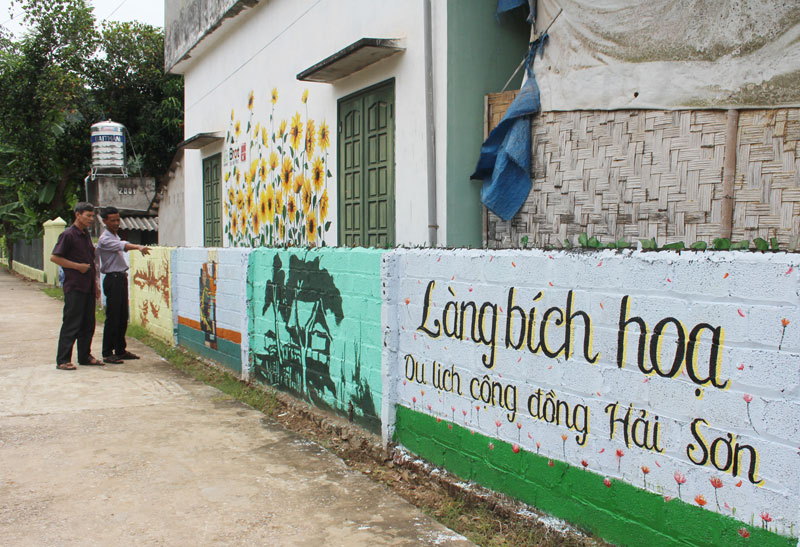
(HBO) – A 800-metre road section of 15 households in Hai Son hamlet, Mai Hich commune (Mai Chau district, Hoa Binh province) was previously full of moss and weeds. With the helping hands of 27 voluntary students from the Hanoi University of Fine Arts, the village has been covered with colourful paintings featuring the unique culture of the Thai ethnic minority group.

Thanks to a
project of the Centre for Community Health and Development (COHED), Mai Hich
commune (Mai Chau district) now has a new name as "Hai Son community-based
tourism fresco village”
The activity was inspired by the Centre for
Community Health and Development (COHED) as part of a project designed to
develop rural areas via environmentally friendly community-based tourism
sponsored by the Bread for the World (BFW) with the target of improving living conditions
of ethnic people in
Vietnam.
Through which, community-based tourism initiatives have generated incomes for
ethnic people in Mai Chau district. The paintings were created by voluntary
students and COHED staff along with residents in Hai Son hamlet. After eight
days of working hard, they changed the grey walls into lively paintings.
Not only painting on the wall, vegetable fences
were also decorated. Children in the hamlet were encouraged to join the
activity with the assistance from voluntary students. Children were
enthusiastic to create lovely pictures highlighting the beauty of their
countryside.
Nowadays, when arriving in Hai Son hamlet,
visitors could put their souls into the nature of the Mai Chau mountainous
region which is poetic through pictures capturing four seasons of the year as
well as the daily life of people such as rice sowing, cultivating and pounding,
along with gong culture, drinking "ruou can” (literally "stem wine"
or "tube wine”), and enjoying "mua sap” (dance of the bamboo)
performances.
Hai Son is a poor hamlet in Mai Hich commune,
mainly cultivating rice and vegetables. Locals enjoy a peaceful life but still
face many difficulties. Endowed with natural advantages, locals hope to
introduce the natural beauty of their land to visitors to develop
community-based tourism and increase their incomes.
Head of Hai Son hamlet Dam Quang Thuong said the
COHED project has empowered local residents to develop community-based tourism.
At present, the hamlet is opening a training course for people to provide homestay
services, focusing on keeping the clean environment. Tourists could experience
local daily activities such as growing rice, weaving brocade and cooking local
special dishes.
With an increasingly vibrant and widespread emulation movement aimed at building cultured residential areas and cultured families, Yen Thuy District has been making steady progress toward improving both the material and spiritual well-being of its people, while fostering a civilized, prosperous, beautiful, and progressive community.
Once lacking recreational spaces and community facilities, Residential Group 2 in Quynh Lam Ward (Hoa Binh City) has recently received attention for the construction of a new, spacious, and fully equipped cultural house. The project followed the model of state support combined with public contributions in both labor and funding.
The "All people unite to build cultural life" movement, which has been effectively integrated with Kim Boi district’s socio-economic development goals, is fostering a lively spirit of emulation across local residential areas, hamlets, villages, public agencies, and enterprises. In addition, through the initiative, traditional cultural values are being preserved and promoted, while community solidarity and mutual support in poverty reduction and economic development are being strengthened.
A working delegation of the Hoa Binh provincial People’s Committee led by its Permanent Vice Chairman Nguyen Van Toan on June 11 inspected the progress of a project to build the Mo Muong Cultural Heritage Conservation Space linked to tourism services in Hop Phong commune, Cao Phong district.
Born and growing in the heroic land of Muong Dong, Dinh Thi Kieu Dung, a resident in Bo town of Kim Boi district, in her childhood was nurtured by the sweet lullabies of her grandmother and mother. These melodies deeply imprinted on her soul, becoming an inseparable part of her love for her ethnic group's culture. For over 20 years, this love for her hometown has driven Dung to research, collect, and pass down the cultural values of the Muong people to future generations.
In the final days of May, the Ethnic Art Troupe of Hoa Binh Province organized performances to serve the people in remote, mountainous, and particularly disadvantaged areas within the province. These were not just ordinary artistic shows, but they were the meaningful journeys aimed at spreading cultural values, enhancing the spiritual life of the people and contributing to the preservation of ethnic minority cultural identities.



